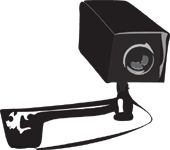Video surveillance: Who's watching you?
More and more practices are using video surveillance. Here's what you need to know about being filmed at work.
The inventory is off by 30 boxes. Accusations start to fly. Team members exchange surreptitious looks and suggest words like investigation, theft, and distrust. Allegations follow and suddenly there's serious suspicion—and team chaos.

Sheila Grosdidier
You wonder how the practice will prove who's guilty and who's innocent. If only someone had caught the crime on tape. These days, it's increasingly possible that your practice did.
According to the American Management Association, more than 50 percent of businesses utilize some type of employee monitoring, including video surveillance. More and more veterinary practices are installing surveillance systems to protect their buildings, equipment, drugs and other inventory, and their employees' physical safety. Some specific examples of the reasons practices give for installing cameras include to:
- Monitor the parking lot for suspicious activity
- Minimize theft by the public and employees
- Watch for employee alcohol and drug use
- Keep an eye on employee attendance problems, such as team members leaving early and coming in late
- Observe team members with patients
- Catch unsafe working conditions
- Provide clear evidence of a crime if one were to occur
- Train team members by showing them the tapes to find areas of improvement
While all these reasons make sense and, ultimately, benefit the practice, the idea of being filmed makes many team members uneasy. This is especially true if you don't understand when surveillance is acceptable.

Melissa Galitz
Know your rights
First off, if you're completing your work and following your practice's policies and procedures, you don't need to fear being filmed at work. Also, if you're being videotaped, you'll probably know it. Most clinics inform their team members about any monitoring and develop related policies. However, most states don't require employers to provide such notification.
Federal wiretap laws—and many state laws—prohibit audiotaping employees. Silent videotaping, though, is often legal. But there are limits. For example, if a certain area of the practice carries an expectation of privacy, such as bathrooms or changing areas, it's likely that even silent surveillance is illegal. In some states, like Connecticut, management can't even install a camera in the employee lounge because that space is considered private.
When thinking about your own practice's surveillance and its fairness to you and your fellow team members, consider whether the cameras are hidden or in full view, whether they're in public and business areas or private rooms, and whether sound is included. If you're concerned the taping is invading your privacy, speak with the practice manager or owner. As a last resort, some employees seek legal advice if conversations with management prove unsuccessful.
To protect and serve
This mix of legalities and Big Brother can sound ominous. But remember that the practice owners and managers are busy people who don't want to spend much time watching security tapes. Generally, they review the videos every now and then as a precaution. You can be sure they're viewing them when concerns arise, and those are the times you just might be protected by the images.
Case in point: A clinic in the Midwest recently suspected team members were stealing from the cash drawer. When employee interviews provided no clues, managers contacted the police. Officers recommended placing a hidden camera near the money drawer and keeping it secret from team members. After 24 hours of video recording, the tapes showed an employee pocketing cash three different times. The other team members were shocked when the guilty person was arrested, and they agreed it was smart to leave the camera in place. They realized the lens protected the business—and them.
Besides providing a means of upholding your reputation and your team's morale, video surveillance helps prevent physical harm. When the public knows cameras guard your practice, you enjoy increased safety from would-be criminals. Of course, you can't rely on this alone. Remember, cameras fail, batteries wear down, film is accidently removed or taped over, and, as such, videotapes only deter danger—they don't guarantee invincibility.
Focus on the positives of being recorded at work. You'll be safer and you might even build stronger client bonds—think video camera in the boarding area so traveling clients can see the great care you're giving their pets. To make surveillance successful at your practice, know your rights and understand both sides of the issue, including what's best for you and the clinic.
Sheila Grosdidier, BS, RVT, is a Firstline Editorial Advisory Board member and partner at the veterinary consulting firm VMC Inc. in Evergreen, Colo. Please send questions and comments to firstline@advanstar.com